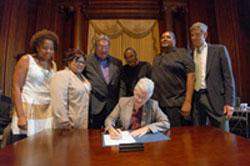Environmental Justice for Tribes and Indigenous Peoples

For many years, EPA’s tribal program and environmental justice programs focused on helping federally recognized tribes develop their own environmental programs. However, EPA was also asked to work with other indigenous peoples, including tribal members and grassroots organizations.
In July 2014, EPA completed its Policy on Environmental Justice for Working with Federally Recognized Tribes and Indigenous Peoples. This Policy explains how the Agency works with tribes and other indigenous groups and members to protect the environment and public health in Indian country. The Policy also talks about how EPA works with indigenous peoples throughout the United States.
Purpose
The Policy describes how EPA works with federally recognized tribes and indigenous peoples throughout the United States, and with others living in Indian country. The seventeen principles of the Policy help EPA protect the environment and public health and address environmental justice concerns in Indian country. The Policy also includes implementation tools available to the Agency.
Scope
The Policy focuses on EPA’s work with federally recognized tribes, state recognized tribes, tribal members, indigenous community-based/grassroots organizations, Native Hawaiians, individual Native Americans, and others living in Indian country. The Policy also discusses EPA’s work with other federal agencies, state agencies, and other interested groups.
Focus Areas
EPA is working to incorporate the seventeen environmental justice principles in the following four areas:
- Direct implementation of federal environmental programs in Indian country, and throughout the United States.
- Work with federally recognized tribes/tribal governments on environmental justice.
- Work with indigenous peoples (state recognized tribes, tribal members, etc.) on environmental justice.
- Collaborate with federal agencies and others on environmental justice issues of tribes, indigenous peoples, and others living in Indian country.
Development of the Policy
EPA began the development of the Policy in 2011, tasking the EPA Tribal and Indigenous Peoples Environmental Justice Work Group, comprised of EPA staff, with creating a draft policy.
In addition, the Agency sought advice and recommendations from the National Environmental Justice Advisory Council (NEJAC), a federal advisory committee to the EPA. The NEJAC's Indigenous People Work Group (IPWG), made up of tribal and indigenous environmental justice stakeholder representatives, assisted the NEJAC in providing advice and recommendations to EPA on how the Agency can work effectively with federally recognized tribes and indigenous peoples to address their environmental justice concerns.
The NEJAC provided the following advice and recommendations to help EPA develop an effective Policy:
- Recommendations for Fostering Environmental Justice for Tribes and Indigenous Peoples, January 2013
- Recommendations for the EPA Policy on Environmental Justice for Tribes and Indigenous Peoples, January 2013
Consultation with tribes, as well as outreach to indigenous stakeholders, was a critical part of the development of the policy.
- The first set of tribal consultation and public comment periods were held February through April 2012. EPA focused on obtaining input on the four focus areas the Agency was planning for the Policy.
- The second tribal consultation period, which focused on the Working Draft of the Policy, started in November 2012 and concluded in February 2013. This consultation overlappped with the indigenous peoples and public comment period held January through February 2013.
- The third and final tribal consultation and public comment periods, held May 5 to June 5, 2014, focused on the Revised Draft of the Policy.
EPA’s Environmental Justice Tribal and Indigenous Peoples Advisors
Each EPA program and region has designated an Environmental Justice Tribal and Indigenous Peoples Advisor (EJ TIPA), to provide advice and facilitate effective implementation of this Policy. The Office of Environmental Justice chairs the EJ TIPA group.
|
Office/Region |
Primary EJ TIPA |
Backup EJ TIPA(s) |
|---|---|---|
|
Office of Water |
Karen Gude (gude.karen@epa.gov), 202-564-9567 |
Felicia Wright (wright.felicia@epa.gov), 202-566-1886 Alice Walker (walker.alice@epa.gov), 202-529-7534 |
|
Office of Air and Radiation |
Pat Childers (childers.pat@epa.gov), 202-564-1082 |
|
|
Office of Solid Waste and Emergency Response |
Kent Benjamin (benjamin.kent@epa.gov), 202-564-9095 |
Pat Carey, carey.pat@epa.gov), 202-566-0199 Janice Sims, (sims.janiceHQ@epa.gov), 202-566-2892 |
|
Office of Chemical Safety and Pollution Prevention |
Oscar Morales (morales.oscar@epa.gov) |
Amanda Hauff (hauff.amanda@epa.gov), (202) 566-0603 |
|
Office of Enforcement and Compliance Assurance |
Jonathan Binder (binder.jonathan@epa.gov), 202-564-2516 |
|
|
Office of Research and Development |
Fred Hauchman (hauchman.fred@epa.gov), 202-564-3151 |
Mary Manibusan (manibusan.mary@epa.gov), 202-564-2827 |
|
Office of General Counsel |
Tricia Jefferson (jefferson.tricia@epa.gov), 202-564-6628 |
|
|
Office of Environmental Information |
Elizabeth "Beth" Jackson (jackson.elizabeth@epa.gov), 202-566-6633 |
|
|
Office of International and Tribal Affairs |
Dona Harris (harris.dona@epa.gov), 202-564-6633 |
|
|
Office of Environmental Justice |
Danny Gogal (gogal.danny@epa.gov), 202-564-2576 |
|
|
Region 1 |
Deborah Brown (brown.deborah@epa.gov), 617-918-1706 |
|
|
Region 2 |
Grant Jonathan (jonathan.grant@epa.gov), 212-637-3843 |
Annette Poliwka (poliwka.annette@epa.gov), 212-637-3884 |
|
Region 3 |
Theresa (Terry) Gallagher (gallagher.theresa@epa.gov), 215-814-2923 |
|
|
Region 4 |
Lisa Berrios (berrios.lisa@epa.gov), 404-562-8318 |
|
|
Region 5 |
Alan Walts (walts.alan@epa.gov), 312-353-8894 |
|
|
Region 6 |
Randy Gee (gee.randy@epa.gov), 214-665-8355 |
|
|
Region 7 |
Althea Moses (moses.althea@epa.gov), 913-551-7649 |
|
|
Region 8 |
Suzanne Bohan (bohan.suzanne@epa.gov), 303-312-6925 |
|
|
Region 9 |
Deldi Reyes (reyes.deldi@epa.gov), 415-972-3795 |
Erskine Benjamin (benjamin.erskine@epa.gov), 415-972-3561 |
|
Region 10 |
Jim Woods (woods.jim@epa.gov), 206-553-2871 |
Running Grass, (grass.running@epa.gov), 206-553-2899 |
